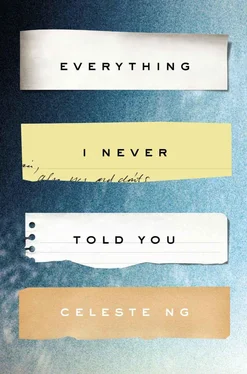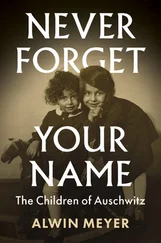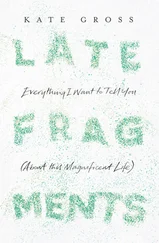“Great,” Lydia said, and this time Hannah actually did turn her face away until she heard her sister’s footsteps on the stairs.
“What happened?” Marilyn murmured to James, who shook his head. Hannah knew. Lydia hadn’t studied. Two weeks ago, before Lydia had come home after school, Hannah had explored her room, looking for treasures. She’d pocketed Lydia’s book from the floor of the closet and, beneath it, had found the rules and regulations pamphlet. When Lydia started to study, Hannah had thought, she would notice her book was missing. She would come looking for it. Every few days, she had checked, but the pamphlet hadn’t moved. Yesterday it had been half-covered by a pair of beige platforms and Lydia’s best bell-bottoms. And the book was still tucked upstairs under Hannah’s pillow.
Upstairs, in her room, Lydia yanked at the necklace, which wouldn’t break. She unhooked it and slammed it inside its box, as if it were a wild thing, and pushed it deep beneath the bed. If her father asked where it was, she would say she was saving it for special occasions. She would say she didn’t want to lose it, don’t worry, she’d wear it next time, Daddy. In the mirror, a fine red line ringed her neck.
By the time Lydia came down to dinner an hour later, the mark had faded away, though the feeling that accompanied it had not. She had dressed up as if for a party, her hair ironed dry and straight and glossy on the big ironing board, her lips coated with jam-colored gloss. James, looking at her, had a sudden memory of Marilyn when they’d first met. “Don’t you look nice,” he said, and Lydia forced herself to smile. She sat bolt upright with that same fake smile at the dinner table, like a doll on display, but only Hannah spotted its fakeness. Her back ached, watching Lydia, every bit of her did, and she slouched in her own chair until she nearly slid off the seat. As soon as dinner was over, Lydia patted her mouth with her napkin and stood up.
“Wait,” Marilyn said. “There’s cake.” She went into the kitchen and in a moment emerged bearing the cake on a tray, candles aglow. The photo of Lydia was gone, the top of the cake refrosted to plain white, with just Lydia’s name. Hiding under the smooth white, Hannah thought, was the pretend driver’s license, the Congratulations and the blue L-Y-D. Though you couldn’t see it, it was there just underneath, covered up but smudged and unreadable and horrible. And you’d be able to taste it, too. Their father snapped picture after picture, but Hannah didn’t smile. Unlike Lydia, she had not yet learned to pretend. Instead she half shut her eyes, like she did during the scary parts of TV shows, so that she could only half see what came next.
Which was this: Lydia waited for them to finish singing. As they reached the last line of the song, James held up the camera and she bent over the cake, lips pursed as if to kiss. Her perfectly made-up face smiled around the table, sweeping each of them in turn. Their mother. Their father. Nath. Hannah did not know everything Lydia thought she understood — the necklace, Louisa, all I want you to remember —but she knew that something had shifted inside her sister, that she was balanced on a dangerous, high-up ledge. She sat very still, as if one wrong move might tip Lydia off the edge, and Lydia blew out the flames with one quick puff.
Lydia had been wrong about Louisa, of course. Back then, on his daughter’s birthday, James would have laughed at the very idea; the thought of anyone other than Marilyn in his bed, in his life, was preposterous. But back then, the thought of life without Lydia had been preposterous, too. Now both of those preposterous things have come true.
When Louisa shuts the apartment door and returns to the bedroom, James is already buttoning his shirt. “You’re going?” she says. Inside, she still clings to the possibility that Marilyn’s visit was just a coincidence, but she is fooling herself, and she knows it.
James tucks in his shirt and fastens his belt. “I have to,” he says, and they both know this is true, too. “It may as well be now.” He’s not sure what to expect when he reaches home. Sobbing? Rage? A frying pan to the head? He doesn’t know yet, either, what he will say to Marilyn. “I’ll see you later,” he says to Louisa, who kisses his cheek, and this is the one thing he’s sure of.
When he enters the house, just after noon, there is no sobbing, no rage — just silence. Nath and Hannah sit side by side on the living room couch, eyeing him warily as he passes through. It is as if they are watching a doomed man march to the gallows, and this is how James himself feels as he climbs the stairs to his daughter’s room, where Marilyn sits at Lydia’s desk, eerily calm. For a long while, she says nothing, and he wills himself still, keeps his hands steady, until she finally speaks.
“How long?”
Outside, Nath and Hannah crouch on the top step in wordless accord, holding their breath, listening to the voices that carry down the hall.
“Since — the funeral.”
“The funeral.” Marilyn, still studying the carpet, presses her lips into a thin line. “She’s very young. How old is she? Twenty-two? Twenty-three?”
“Marilyn. Stop it.”
Marilyn doesn’t stop it. “She seems sweet. Quite docile — that’s a nice change, I suppose. I don’t know why I’m surprised. I guess you’re long overdue for a trade-in. She’d make a very nice little wife.”
James, to his surprise, blushes. “No one’s talking about—”
“Not yet. But I know what she wants. Marriage. Husband. I know her type.” Marilyn pauses, remembering her younger self, her mother’s proud whisper: a lot of wonderful Harvard men. “My mother spent her whole life trying to turn me into that type.”
At the mention of Marilyn’s mother, James stiffens, as if he has turned to ice. “Oh, yes. Your poor mother. And then you went and married me.” He chokes out a laugh. “What a disappointment.”
“I am disappointed.” Marilyn’s head snaps up. “I thought you were different.” What she means is: I thought you were better than other men. I thought you wanted better than that. But James, still thinking of Marilyn’s mother, hears something else.
“You got tired of different, didn’t you?” he says. “I’m too different. Your mother knew it right away. You think it’s such a good thing, standing out. But look at you. Just look at you.” He takes in Marilyn’s honey-colored hair; her skin, even paler than usual from a month spent indoors. Those sky-colored eyes he has adored for so long, first in his wife’s face and then in his child’s. Things he has never said, never even hinted to Marilyn before, pour from his mouth. “You’ve never been in a room where no one else looked like you. You’ve never had people mock you to your face. You’ve never been treated like a stranger.” He feels as if he has vomited, violently, and he drags the back of his hand across his lips. “You have no idea what it’s like, being different.”
For a moment James looks young and lonely and vulnerable, like the shy boy she’d met so long ago, and half of Marilyn wants to gather him in her arms. The other half of her wants to batter him with her fists. She gnaws her lip, letting the two sides struggle. “Sophomore year, in the lab, the men used to sneak up behind me and try to lift up my skirt,” she says at last. “One time they came in early and pissed in all of my beakers. When I complained, the professor put his arm around me and said—” The memory catches in her throat, like a burr. “ Don’t worry about it, honey. Life’s too short and you’re too beautiful. You know what? I didn’t care. I knew what I wanted. I was going to be a doctor.” She glares at James, as if he has contradicted her. “Then — fortunately — I came to my senses. I stopped trying to be different. I did just what all the other girls were doing. I got married. I gave all that up.” A thick bitterness coats her tongue. “Do what everyone else is doing. That’s all you ever said to Lydia. Make friends. Fit in. But I didn’t want her to be just like everyone else.” The rims of her eyes ignite. “I wanted her to be exceptional.”
Читать дальше












